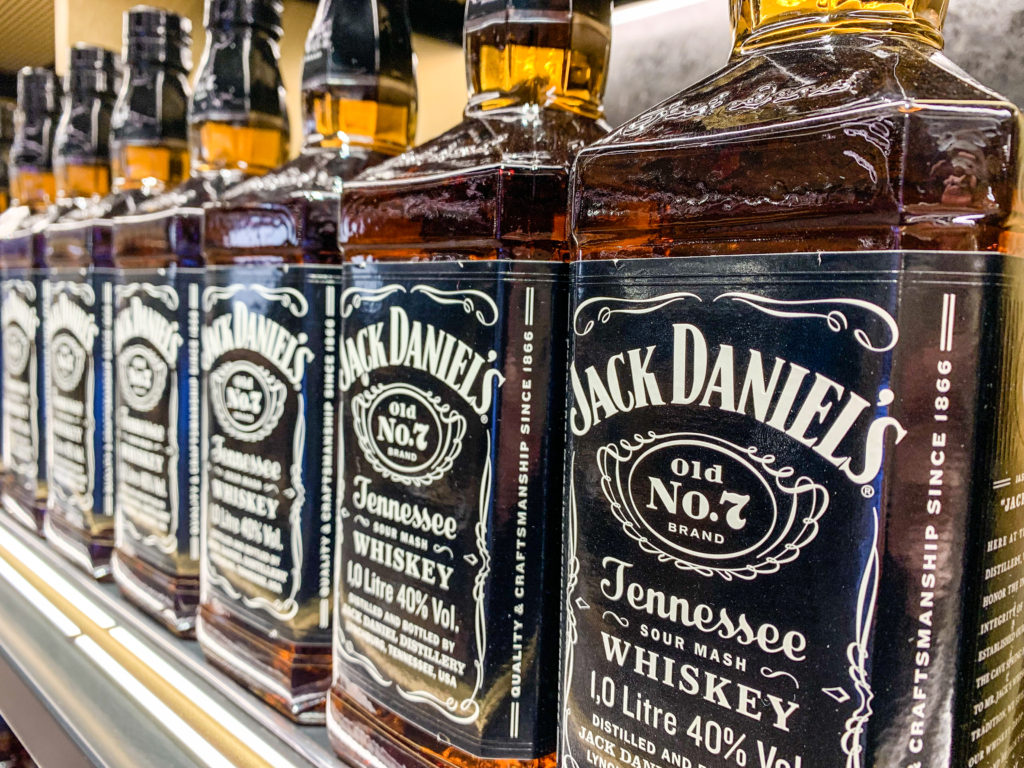VIP Products manufactures and sells a squeak toy for dogs called “Bad Spaniels.” Makers of Jack Daniel’s whiskey allege that the toy infringes on its trademarks. Makers of Bad Spaniels assert that the product is a parody protected by freedom of speech. The Supreme Court will decide whether the Jack Daniel’s trade dress amounts to more bark than bite.
Case Facts and Procedure
The Bad Spaniels Silly Squeaker dog toy is shaped like a bottle of Jack Daniel’s whiskey, but there the similarity ends, argues the toy’s manufacturer, VIP Products. First, there is a dog’s image in the center of the Bad Spaniels toy. Second, where Jack Daniel’s has a product description of “Old No. 7 Brand Tennessee Sour Mash Whiskey,” the Bad Spaniels toy replaces this with “the Old No.2 on Your Tennessee Carpet.” And where Jack Daniel’s has the alcohol percentage, 43%, Bad Spaniels offers that the toy is 40% poo. The bottle also has a disclaimer that reads “not affiliated with Jack Daniels Whisky.”
Jack Daniel’s Properties, LLC filed a federal trademark infringement allegation in Arizona against VIP Products LLC. The district court ruled in favor of Jack Daniel’s, saying that the distinctive bottle and non-functional trade dress were entitled to trademark protection, and that VIP Products had infringed on their marks. However, on appeal, a three-judge panel of the Ninth U.S. Circuit Court of Appeals ruled that “Bad Spaniels” did infringe on the Jack Daniel’s trade dress, but did not constitute trademark infringement or trademark dilution. The court cited for several reasons, but largely reasoned that while the toy looks like a bottle of Jack Daniel’s, there are many “lighthearted, dog related alterations.” The court also vacated the trial court’s injunction barring the manufacture and sale of the Bad Spaniels dog toy.
Is a Poo Parody Worthy of First Amendment Protection, or Does it Smell of Infringement?
When petitioning for review by the U.S. Supreme Court, attorneys for Jack Daniel’s argued that the VIP Product toy was a joke on them, because it harmed their brand and encouraged consumers who were not familiar with Jack Daniel’s to associate their product with excrement. A number of trade associations were cited in the petition, supporting the Jack Daniel’s argument that the decision undermined their work to promote responsible drinking. Additionally, the American Intellectual Property Law Association submitted a petition for the Supreme Court to review the case to further clarify what constitutes artistic protection.
Likelihood of Confusion, Likelihood of Dilution and The First Amendment
This case will determine whether a parody deserves First Amendment protection or should be subject to the Lanham Act likelihood of confusion analysis. However, when parties in a trademark infringement case require evidence of consumer confusion, they often rely on consumer surveys. In this case, either side could use a likelihood of confusion survey to determine whether consumers would be confused about the origin or affiliation of the product. A likelihood of dilution survey could also be conducted to determine whether the Jack Daniel’s mark was diluted by the sale of the dog toys.
MMR Strategy Group offers the services of experts in designing and conducting consumer surveys, and our experts frequently testify on behalf of our clients. We are watching this case with great interest to see what the Supreme Court will rule.
*Update* See case resolution and ruling analysis here
